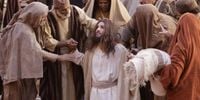In a remarkable display of faith-based cinema, two films centered around the biblical event of the Last Supper have recently made their mark at the box office. The Chosen: Last Supper - Part 1, which premiered theatrically, has outperformed expectations, while another film titled The Last Supper has faced challenges in its release.
The Last Supper debuted in theaters in mid-March 2025, but it finished just outside the top five on the domestic charts. As it concluded its run this past weekend, it managed to pass what is expected to be its final box office milestone, generating around $300,000 in its third weekend and surpassing the $6 million mark domestically. However, the film experienced a significant drop in theaters, losing around 700 locations, falling from over 1,500 in its first and second weeks to around 800 in its third week. Ultimately, The Last Supper finished at the number 10 spot on the domestic charts.
In contrast, The Chosen: Last Supper has been a resounding success, finishing third at the box office, trailing only behind the latest Jason Statham vehicle A Working Man and Disney's mega-budget film Snow White. The Chosen: Last Supper generated over $11 million last weekend alone, contributing to the franchise's total domestic box office haul, which has now surpassed $80 million.
Both films have resonated with their target audiences, as evidenced by their positive reception on Rotten Tomatoes. The Chosen holds an impressive 99% approval rating, while The Last Supper has settled at an 80% audience score. Directed by Mauro Borrelli, The Last Supper features Jamie Ward as Jesus Christ, James Oliver Wheatley as Saint Peter, and Robert Knepper as Judas Iscariot. Meanwhile, The Chosen stars Jonathan Roumie as Jesus, who previously appeared in the film Jesus Revolution, another faith-based success that grossed over $50 million domestically.
The Chosen is a historical drama that chronicles the life of Jesus and those around Him, set against the backdrop of Roman oppression in first-century Palestine. The series aims to provide an authentic look at Jesus' revolutionary life and teachings. As Holy Week approaches, the anticipation for the continuation of The Chosen is palpable, with Part 2 of Season 5 set to be released on April 4, 2025.
Dallas Jenkins, the creator and executive producer of The Chosen, shared insights about the series during a recent press tour. He emphasized the themes of faith and trust that are central to Season 5, stating, "Can you trust, can you have faith, can you follow, even when you don’t understand?" Jenkins noted the personal challenges he faces in his life, paralleling them with the struggles of the disciples during Holy Week.
In his reflections, Jenkins expressed gratitude for the opportunity to celebrate the impact and growth of The Chosen, noting the importance of recognizing milestones along the way. He stated, "It’s easy to be so focused on the work that I don’t get a moment to enjoy the impact or the growth." He further shared a metaphor about his role in the production, saying, "My job is 5&2… just want to make the best five loaves and two fishes I can, and if God multiplies, that’s great."
Jonathan Roumie, who portrays Jesus in The Chosen, also spoke about the emotional intensity of Season 5. He described it as a "steamroller" and a "bulldozer" of emotions, highlighting the climactic conflicts between Jesus and the authorities, as well as the frustrations experienced by the disciples. Roumie remarked, "It will be the most beautiful, the most complex, most intense season we have ever done."
As audiences flock to theaters for these faith-based films, the success of The Chosen franchise highlights the growing interest in religious narratives at the box office. With devoted fans eagerly awaiting the next installments, the series continues to build on its legacy, proving that there is a substantial market for stories that explore faith, trust, and the human experience.
As Holy Week approaches, the timing of these releases could not be more relevant. With The Chosen: Last Supper capturing the attention of viewers, it stands as a testament to the power of storytelling in conveying messages of hope and faith. The film's success, along with the challenges faced by The Last Supper, underscores the competitive landscape of religious cinema and the diverse ways in which these stories are being told.
In conclusion, the juxtaposition of The Chosen and The Last Supper reflects the dynamic nature of faith-based filmmaking. As the industry continues to evolve, both films contribute to a broader conversation about spirituality and the role of cinema in exploring profound themes. With audiences responding positively to these narratives, it is clear that faith-based films are carving out a significant space in the entertainment landscape.








